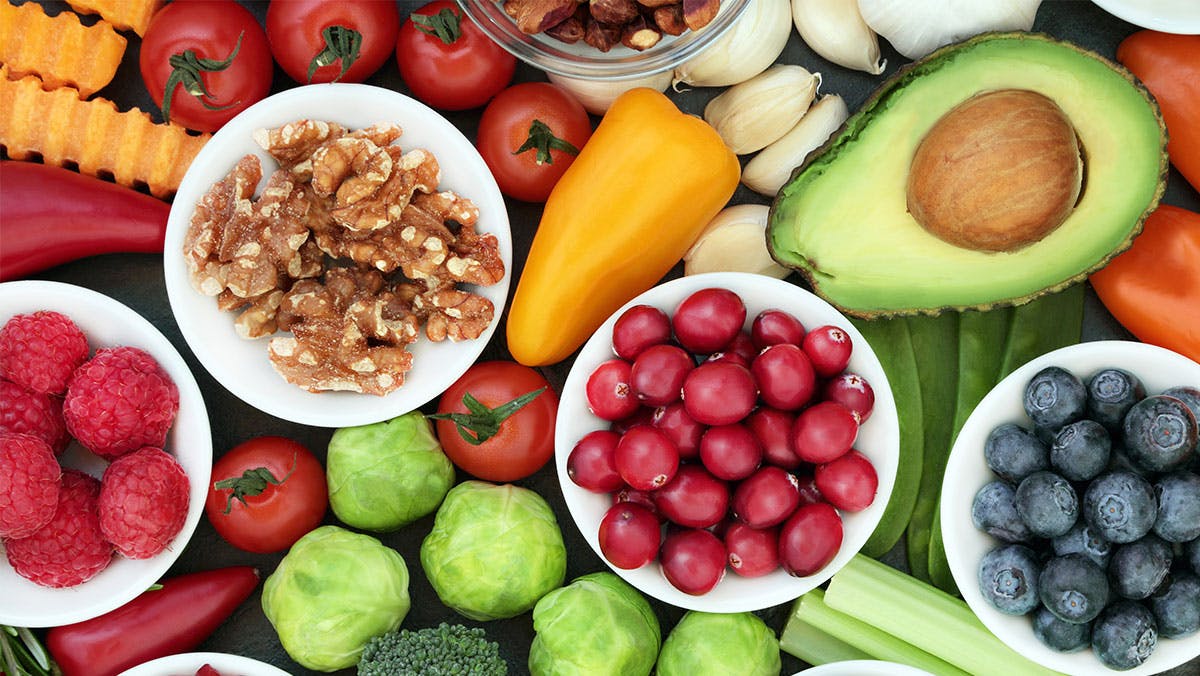4 Tips for a More Balanced Diet
Contributed by Elizabeth Ward, MS, RD
In a perfect world, we would all follow the suggested dietary guidelines every day, get enough physical activity and make sure each night is filled with the proper amount of restful sleep. However, our busy schedules can make it difficult to get what is needed for a healthy lifestyle, including the vitamins and minerals that support your health.

In fact, you may be surprised to learn that many adults don’t get enough of six essential nutrients—vitamins A, C, D, and E, and the minerals calcium and magnesium.
A more balanced eating plan, paired with a complete multivitamin, is a great strategy for increasing your intake of a variety of these vitamins and minerals. Here are some ways to help achieve a better-balanced diet that can fit into your daily routines.
1. Include at Least Five Servings of Fruits and Vegetables Daily
When life gets busy and you’re on the run, it’s not always easy to consume the five servings of fruits and vegetables that most adults need every day. We’re tempted by what’s fastest, tastiest, or most convenient, especially when it comes to snacking. But eating produce does go a long way to satisfying the suggested intakes for several vitamin and minerals, including vitamins A, C, and E.[1]
The great news is that some of your regular fruits and vegetables may be more nutritious than you think. For example, mushrooms are the only item in the produce aisle with vitamin D, and mushrooms that have been exposed to UVB rays (the same rays that come from sunshine) have even more of this vital nutrient.[2]
Some produce, including dark green leafy vegetables, provide magnesium and calcium. Have a serving of fruits or vegetables (or both!) at every meal, and consider them for snacks, too. Fruit smoothies made with milk or Greek yogurt are a great source of calcium and are a delicious and nutritious alternative to high calorie desserts and snacks.[3]
2. Eat at Least Two Seafood Meals a Week
Seafood is often thought of as a prime source for “good” fats and protein, but it’s also a great way to get vitamin D, calcium (if you eat the bones of small fish, like sardines), and vitamin A—three of the six essential nutrients people often don’t get enough of from food alone.[4]
The Dietary Guidelines for Americans recommends eating at least two meals containing fish weekly not only for the heart-healthy fat that fish provides, but for several other nutrients, including the vitamins and minerals that support overall health. Meals with fish don’t need to be elaborate or fussy to be beneficial. You can reap the benefits from a tuna salad sandwich made with reduced-fat mayonnaise. Top a hearty green salad with cooked canned salmon, too.
If you have fish or seafood allergies, you can get vitamin D from fortified foods such as milk, orange juice, and yogurt—foods that also contain calcium. Sweet potatoes, carrots, and dark green leafy vegetables supply vitamin A.
3. Don’t Shy Away from All Grains
Fad diets that drastically restrict your calories often cut out grains entirely. While loading up on highly refined carbohydrates, such as white bread, crackers, and sugary treats elevates blood glucose to levels that could affect heart health, some grains are better for you than others.
Whole grains supply several nutrients, including heart-healthy fiber.[5] Snack on popcorn (a whole grain!) instead of pretzels, and try a new whole grain, such as quinoa, for a change.[6]
4. Avoid Cigarettes
If you’re trying to quit, keep it up! When you quit, your sense of smell and taste improves. Food will start to taste better, and chances are your diet will improve, helping you to meet your vitamin and mineral needs. Cigarette smoking also depletes the levels of vitamin C in your bloodstream. According to the Institute of Medicine, smokers have a higher daily requirement for vitamin C. Include oranges, kiwi, strawberries, or a glass of orange juice to meet your daily vitamin C needs, whether you’re a smoker or not.[7]
Day to day, it may be difficult to satisfy your entire daily vitamin and mineral needs from food alone. The good news is that in addition to your food choices, you can reach for a complete multivitamin that supplies an array of nutrients and helps support your overall health.
Contributed by Elizabeth Ward, M.S., R.D., a writer and a nutrition consultant who specializes in family nutrition, women's health, and weight control.










